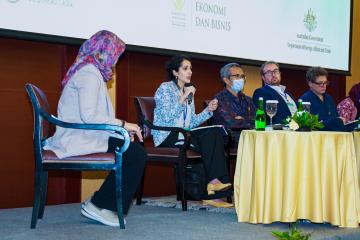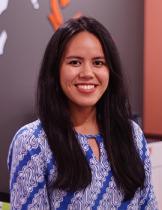
A decade of empowering change: Celebrating 10 years of improving lives through evidence in Southeast Asia
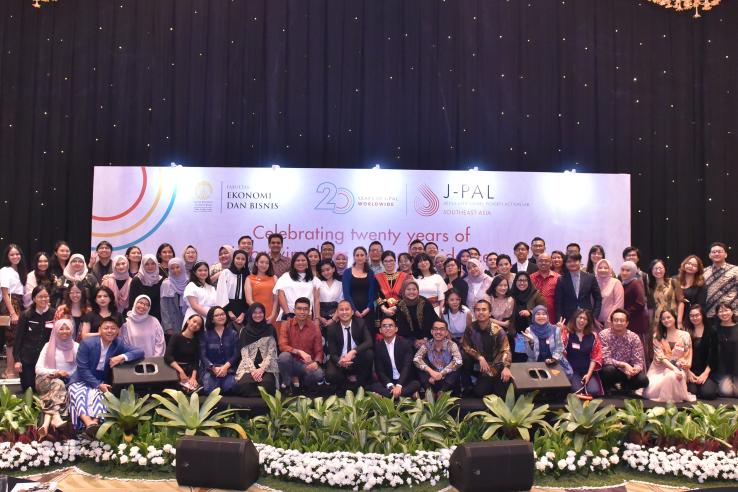
Photo credit: J-PAL SEA
To mark the tenth anniversary of J-PAL Southeast Asia (SEA), we hosted a gala dinner on July 18, 2023, in Jakarta, Indonesia. The event was attended by a wide range of J-PAL partners, including representatives from government institutions, academics, local and international development practitioners, non-governmental organizations (NGOs), and the private sector, as well as many of J-PAL’s affiliated researchers, alumni, and staff.
Celebrating our roots
During President Susilo Bambang Yudhoyono’s administration from 2004–2014, poverty reduction emerged as the top priority for the Government of Indonesia. During this period, the government invested significantly in social protection programs, including cash transfers and subsidized food, and implemented strategies to grow small and medium enterprises.
Aligned with this mission, the J-PAL Southeast Asia office was launched at the University of Indonesia’s Faculty of Economic and Business, Institute for Economic and Social Research (Lembaga Penyelidikan Ekonomi dan Masyarakat – Fakultas Ekonomi dan Bisnis Universitas Indonesia/LPEM FEB UI) in 2013, with the support from the government of Australia, to reduce poverty and promote inclusive growth through rigorous research.
At the gala dinner, Lina Marliani (Executive Director, J-PAL SEA), Rema Hanna (Scientific Director, J-PAL SEA; Jeffrey Cheah Professor of Southeast Asia Studies, Harvard Kennedy School) shared their reflections on the remarkable milestones reached by J-PAL SEA in our ten-year journey, much of which has been made possible by the Government of Indonesia and our partners’ steadfast commitment to our mission. In addition, Iqbal Dhaliwal (Global Executive Director, J-PAL) also shared his insights on J-PAL’s journey through the past two decades in advancing policy-relevant research and reflections on the magnitude of the collaborative efforts of J-PAL staff, researchers, and partners across the seven regions where J-PAL works.
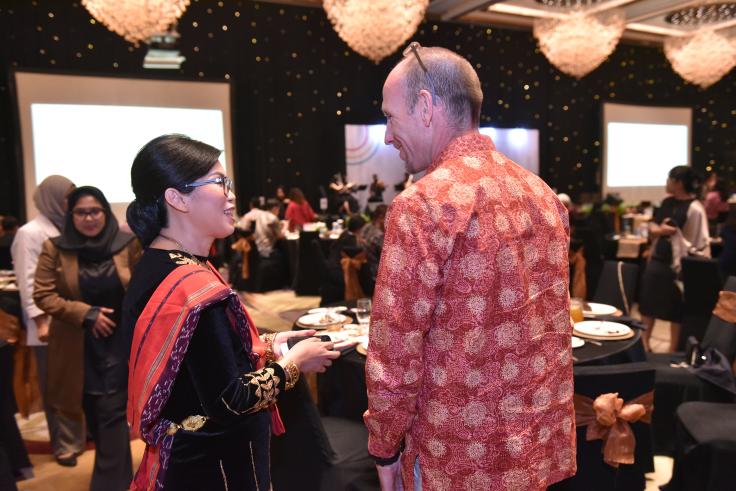
Since its establishment ten years ago, J-PAL SEA has become a leading voice in efforts to ensure that regional policies intended to reduce poverty are informed by rigorous scientific evidence:
1. Playing a pivotal role in the assessment and improvement of policies across a diverse array of topics
J-PAL affiliated professors’ research is motivated by pressing policy questions. Over the past decade, we conducted 21 randomized evaluations across various sectors, including finance, firms, health to political economy, and governance. Notable examples include studies on the impact of information campaign on the enrollment and retention of non-poor informal workers in Indonesia’s national health insurance scheme, Jaminan Kesehatan Nasional (now known as BPJS Kesehatan), and the impact of celebrity Twitter endorsement for a child immunization campaign on the public’s opinion and behavior towards immunization.
Through our work, we have positively impacted more than 100 million lives through programs and policies which were informed by evaluations conducted by J-PAL affiliated professors in the region. Our commitment remains steadfast in contributing to evidence-based policymaking, fostering a brighter and more sustainable future for Indonesia and beyond.
2. Generating knowledge through randomized evaluations to inform policy decisions
At our core, we are committed to leveraging research results generated by J-PAL affiliated professors to inform decision-making. Our policy team distills research findings into actionable insights for governments, NGOs, and others seeking to scale up or improve the effectiveness of their programs, bridging the gap between knowledge and impactful action.
Through dedicated efforts, evidence generated by J-PAL affiliated professors has informed at least nine national policy decisions in Indonesia. Notably, research findings informed the scale-up of the delivery of Raskin ID cards (now known as Program Sembako), significantly improving food security for vulnerable households. Additionally, J-PAL’s research has also contributed to the expansion of Program Keluarga Harapan, making strides in reducing poverty and enhancing socio-economic opportunities for families in need. Amid the Covid-19 pandemic, J-PAL affiliated professors also collaborated with policymakers to employ the community targeting method for the Covid-19 relief cash transfer program in Indonesia. This data-driven decision-making proved powerful during the crisis, providing much-needed support to those affected by the pandemic.
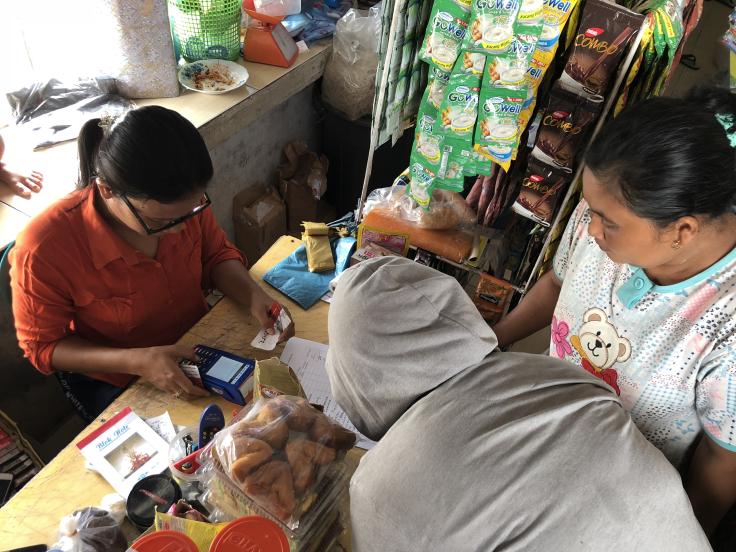
3. Establishing a cadre of local researchers and policy practitioners in development economics
To strengthen the use of rigorous evidence in policymaking, J-PAL SEA also focuses on increasing the pipeline of local researchers and evidence-savvy policy practitioners. One of our key priorities is to bring in Indonesian scholars to be co-authors of J-PAL’s affiliated professors’ research to promote knowledge transfer around research techniques and enhance the relevance of the research to the local context. To date, 41 local researchers have co-authored J-PAL research studies.
Furthermore, to build the capacity of local researchers and partner organizations to become better producers and consumers of randomized evaluation, we host many workshops and training sessions. We have delivered training to over 1,500 participants from various organizations, including government and development partners in South Korea, Papua New Guinea, and Thailand.
Lastly, we also offer mentorship to our staff as they apply to graduate schools, fostering a new generation of researchers. Notably, 11 of our alumni have pursued graduate degrees, and many others have advanced their careers in public policy. During the dinner, Aulia Larasati (Program Manager, J-PAL SEA), Patrya Pratama (Founding Chief Executive Officer & Executive Director, INSPIRASI Foundation), and Amri Ilma (Chief Operating Officer, Edu Farmers Foundation), shared how their experiences at J-PAL SEA contributed to their academic and professional pursuits.
4. Building partnerships to support our work in increasing evidence-based policymaking
In our journey, we formed more than 70 strategic partnerships with the government, NGOs, donors, research organizations, and the private sector. Our partners have been instrumental in our work, notably through their demand for rigorous evidence, willingness to evaluate and learn, and appetite for data-driven decision-making.
We were honored to have two long-standing partners speak at the dinner. Simon Ernst (Counsellor, Development Effectiveness and Sustainability Section, Governance and Human Development Branch, Australia Embassy Jakarta), reflected on our decade-long partnership, which has now concluded. On the other hand, Teguh Dartanto (Dean of the Faculty of Economics and Business, Universitas Indonesia), a representative from our host university, highlighted the importance of fostering effective academic-research partnerships to create better evidence, society, and policy.
In addition, we also invited Linda Hoemar Abidin (Supervisory Board Member, Filantropi Indonesia; Supervisory Board Chair, Koalisi Seni) to share insight into other organizations’ activities in policy advocacy. Notably, Linda Abidin shed light on Koalisi Seni’s advocacy to improve Indonesia’s cultural and art ecosystem.
Looking ahead
Over the past decade, we have much to celebrate in terms of making progress toward our goal of promoting the use of data and evidence to inform poverty alleviation policies across the region. We remain committed to this mission. Moving forward, we will expand into key research areas, including the environment and climate change (air pollution and waste management), gender (women's economic empowerment and female labor force participation), education (ensuring quality learning for all), and social protection (enhancing resilience and adaptability of social programs during crises).
Moreover, we aim to extend our reach to the broader Southeast Asia region through expanded research and training efforts, as well as building partnerships with local researchers that have not been reached yet, particularly those based in eastern Indonesia.
Want to learn more about our journey? Check out our anniversary highlights or follow us on LinkedIn and Twitter to stay updated.
Related Content

Community-based targeting to combat Covid-19-induced poverty
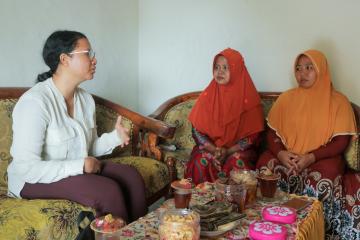
Understanding the hidden factors influencing child marriage: Lessons from an impact evaluation
